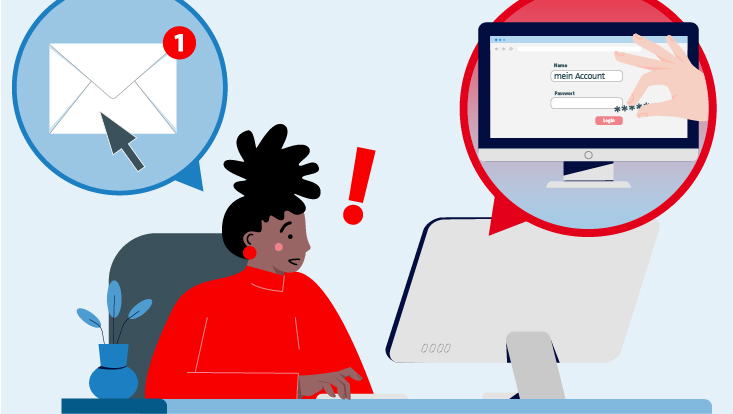Impact of the coronavirus pandemic on staff
3 February 2023, by Newsroom-Redaktion

Photo: UHH/Schell
The most important questions and answers for staff.
Organizing your work
What are the regulations for working from home (including insurance and other information)?
Last update: 3 February 2023
If there are no operational arguments for working in the office, supervisors can continue to make agreements with their staff to work from home. Supervisors decide in agreement with their staff if there are compelling reasons for working in the office.
The arrangements for working from home as a precautionary measure to prevent the spread of the coronavirus must be agreed directly between you and your supervisor (in writing—via email or using the form in the Staff Service Portal (PDF, accessible, in German)). Any questions that arise must also be clarified between these parties. Flexitime regulations apply when working from home as do staff members’ core working hours. The rules on recording working hours also apply when working from home. A form is available on the HR page in the Staff Service Portal for this purpose. Professors are exempt from this regulation.
Supervisors are instructed to arrange flexible remote-working hours with employees forced to stay at home due to a lack of childcare options in the wake of school and childcare center restrictions. This may include hours outside standard flexitime. If an employee cannot work from home while looking after their children, they may use vacation days or flexitime credits. In this case, their account may go into a negative balance as permitted in the flexitime regulations.
Liability for damage to company property
Pay scale employees and civil servants are liable for any damage or destruction of company property (e.g., work equipment, such as laptops) if caused by intent or gross negligence on their part (cf. Section 3 subsection 7 of the collective wage agreement for the public sectors of the German states [Tarifvertrag für den öffentlichen Dienst der Länder, TV-L], Section 48 of the act on the status of civil servants [Gesetz zur Regelung des Statusrechts der Beamtinnen und Beamten in den Ländern, BeamtStG]). The same applies in cases where equipment provided by the employer may be used at home or away from the office, provided that the damage or destruction took place during a work-related activity.
Tax deductions
The decision as to whether employees can deduct the costs of working from home lies with the respective internal revenue office. To compensate for the additional burden of working from home due to the coronavirus pandemic, employees should be able to deduct up to EUR 5 per day for 2022 as well. This should apply for a maximum of 120 days for a total of up to EUR 600.
From 2023, the lump sum for working from home becomes permanent. For each day worked from home in 2023, employees will be able to deduct EUR 6 per day. Whereas the lump sum was previously limited to EUR 600 per year, employees can claim up to EUR 1,260 per year from 2023. This means that from now on, 210 instead of 120 days of working from home will be considered.
Employees can claim this lump sum even if they do not have a separate office in their home. This particularly reduces the burden on families with smaller apartments, as a separate office is no longer a prerequisite for a tax deduction.
This lump sum will be offset against the valid employee exemption amount, meaning it will go into effect only when the exemption amount is exceeded. Explicit proof from the employer is not currently considered necessary. If internal revenue offices request such proof from employees, contact the HR staff member responsible.
Do we already know the plan for summer 2023?
Last update: 1 February 2023
The University always takes its cues in the pandemic from the national coronavirus regulations and the Federal State of Hamburg. Accordingly, there are currently no special restrictions or guidelines.
Does the University have any specific hygiene regulations? (masks, disinfectant) Hygiene measures
Last update: 1 February 2023
No, but in all buildings, the conditions will be created to ensure compliance with basic general protective measures.
Regular ventilation is important for reducing the risk of infection. The duration, nature, and frequency of such ventilation depends on the methods available, the duration of the event in question, and the use of the space.
- Rooms with windows should be aired out several times per hour by ventilating crosswise and/or by opening windows fully.
- If possible, do not use rooms without a mechanical ventilation system and with windows that cannot be opened by design or for other reasons.
What are the regulations for staff members with children?
Last update: 5 October 2022
Supervisors are instructed to arrange flexible remote-working hours with employees forced to stay at home due to a lack of childcare options in the wake of school and childcare center restrictions. This may include hours outside standard flexitime. If an employee cannot work from home while looking after their children, they may use vacation days or flexitime credits. In this case, their account may go into a negative balance as permitted in the flexitime regulations.
Furthermore, the entitlement requirements for childcare leave have changed. Each parent can now take up to 30 days per child. Single parents can take up to 60 days per child. This change applies until the end of 2023. See the PDF overview (accessible) for further information, including for civil servants.
Find information and tips on family life and working from home in this new situation on the pages of the Family Office and the Equal Opportunity Unit (PDF, in German only). There is also an overview (PDF) of all support services for supervisors and staff who currently have childcare and home-schooling responsibilities.
Can I care for close relatives?
Last update: 15 July 2021
Due to the coronavirus pandemic, the German government has expanded the regulations governing family care. For further information, such as the eligibility period and entitlement regulations for civil servants and pay scale employees, see the PDF overview (accessible).
What do I do if I have COVID-19 or I have reason to suspect that I may be infected?
Last update: 3 February 2023
From 1 February 2023, there is no longer a quarantine obligation. Nonetheless, staff members who are sick should stay at home and, if possible, do their work digitally.
If you are unable to work, you must submit a doctor’s note following the third day of illness.
Since 4 August 2022 until the end of March 2023, you can also obtain a doctor’s note via telephone. Patients with mild respiratory symptoms can obtain a doctor’s note via telephone for up to 7 days. You can also call your doctor for a onetime 7-day extension of this sick leave.
Technology and communication
Last update: 1 April 2022
Digital communication
Last update: 1 April 2022
There are various ways to communicate using online solutions. The telephone services of the Regional Computing Center (RRZ), which use the city’s telephone infrastructure (Dataport), support teleconferencing. Universität Hamburg also operates 2 videoconferencing platforms that are licensed for use by all employees and students: DFNconf and Zoom.
Adhere to the Instructions for Using the Zoom Videoconference System of 30 July 2021 (PDF) when using Zoom (regulations on, among other things, limiting the number of participants, deleting minutes, prohibiting recordings, and data protection in general).
To ensure a professional presentation in your videoconferences, select from the various Universität Hamburg–themed backgrounds in the Staff Service Portal.
Data security and privacy
Last update: 20 May 2020
When you access applications or files of Universität Hamburg from your personal device, adhere to the following guidelines to ensure that data security and privacy are upheld:
- If anyone else has access to your personal device, always sign out from your device when you finish work or leave your office.
- You must use an operating system that is being supported with regular security updates. If you are using Microsoft Windows, only version 1903 and upwards of Windows 10 are acceptable. Do not use any other version of Microsoft Windows.
- Either activate the automatic installation of updates and patches or carry out manual updates every week. The same applies to any additionally installed software, such as Internet browsers.
- Install and activate a software that detects malware automatically. On Windows systems, you may use the Windows Defender component. Alternatively, we recommend the Sophos virus scanner, which Universität Hamburg has licensed for use on private devices. It is also available for other operating systems.
- Always think twice before entering your user login (UHH-Kennung) or University username (B-Kennung) and password into a website. Only do so if you are certain that the website is on the official Universität Hamburg domain. If you suspect that your login information may have been compromised, immediately change your password in the user administration tool or contact the service hotline of the Regional Computing Center (RZZ). Do not forget to enter your mobile phone number into the system to ensure that you can use the password reset process if necessary.
- In light of recent events, to prevent attacks on your computer and your data, and thus also on the central Universität Hamburg IT infrastructure, be especially careful when using email. The Regional Computing Center (RRZ) has implemented effective measures to protect the IT infrastructure. Your mindful use of all information technology and your full attention are required nonetheless. Use caution when opening attachments or links in emails or links in documents, and always be aware that sender addresses and mail texts can be spoofed. See the information and recommendations provided by the RZZ (german (PDF), english (PDF)). Take note, in particular, of the information about the Emotet malware.
Information on work-related travel
What regulations currently apply for work-related travel?
Last update: 1 February 2023
As a rule, work-related travel is permitted. Current information and warnings issued at short notice by the Robert Koch Institute (RKI) and the Federal Foreign Office (e.g., flight restrictions) must be observed when booking travel services or before you begin your travels. Especially for travel to regions with a virus variant (see the current list of regions on the pages of the Robert Koch Institute), you must inform yourself about the coronavirus-related regulations specific to the country and, if applicable, the institution you are visiting.
What regulations apply to people returning from abroad?
Last update: 1 February 2023
Staff and students returning from regions with a virus variant must comply with the Ordinance on Coronavirus Entry Regulations. Before entering University premises, staff and students must inform themselves about the requirements established by the City of Hamburg and conduct themselves accordingly.
Notes on teaching
What regulations apply for teaching?
Last update: 1 February 2023
The University always takes its cues in the pandemic from the national coronavirus regulations and the Federal State of Hamburg. Accordingly, there are no current special restrictions or guidelines for teaching and examinations.
Are masks mandatory?
Last update: 1 February 2023
No. Wearing a medical mask (covering mouth and nose) or an FFP2 mask to protect yourself or others is voluntary.
Are there further hygiene rules?
Last update: 1 February 2023
No, but in all buildings, the conditions will be created to ensure compliance with basic general protective measures.
Regular ventilation is important for reducing the risk of infection. The duration, nature, and frequency of such ventilation depends on the methods available, the duration of the event in question, and the use of the space.
- Rooms with windows should be aired out several times per hour by ventilating crosswise and/or by opening windows fully.
- If possible, do not use rooms without a mechanical ventilation system and with windows that cannot be opened by design or for other reasons.
Do digital alternatives have to be provided?
Last update: 1 February 2023
Teaching staff are not required to provide additional digital courses for students.
How does the University help students in special circumstances, for example, if they have disabilities or family duties?
Last update: 5 September 2022
Teachers and students may contact the Office for Students with Disabilities and Chronic Illnesses (website in German only) and the Family Office if they have any questions. More information is available in the current handout for dealing with students certified as (partially) unable to attend in-person teaching or examinations in Winter Semester 2022/23 (PDF, accessible).
Research and research funding
Project managers should consult the Department of Research Management and Funding before clarifying any project-specific questions with the funding providers.
Extending academic employment contracts
Last update: 30 November 2020
The coronavirus pandemic had also had significant consequences for academic staff. In particular, numerous research projects had to be postponed indefinitely or are continuing under limited conditions due to the pandemic-related closures of labs, libraries, etc. For this reason, both the federal and state government have adjusted the legal framework for employment conditions.
Civil servants
In individual cases, academic counselors and junior professors can extend their temporary civil service status by up to 12 months. Find more information in the Staff Service Portal.
Employees with wage-agreement contracts
Doctoral and postdoctoral researchers who are employed on a fixed-term contract in accordance with Section 2 subsection 1 of the academic fixed-term labor contract act (Wissenschaftszeitvertragsgesetz, WissZeitVG) may extend the permitted maximum possible duration of the fixed-term contract by 6 or 12 months respectively in individual cases. Find more information in the Staff Service Portal.
For employees in externally funded projects, extending the employment contract also depends on the requirements of the external funding provider.
Funding for COVID-19 researcher
Last update: 24 April 2020
Universität Hamburg researchers conducting COVID-19 research projects can apply for financial support for cooperation with international partners.


